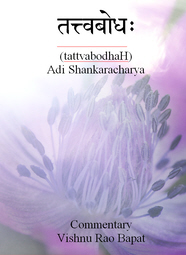Q: Undaunted by my belief that meditation to find the self (soul) is difficult, I would like to try, but there are no teachers in my area. Therefore, in the first instance, I would really appreciate your advice regarding a book to follow for this type of meditation that is suitable for a beginner.
A: The purpose of meditation is to help gain control of the mind and senses so that you can cultivate dispassion and discrimination and still the mind when listening to the teacher.
Meditation cannot enable you to ‘find the self’. You are already the Self – you just have not realized this. What has to happen is for the mind to receive knowledge about the Self, clear any misunderstandings, resolve any doubts etc. Ideally, you need a qualified teacher for this – someone who knows the truth and is able to convey the relevant steps (via story, metaphor etc.) to help someone else come to the same understanding.
As an introduction to Advaita, there are three books I would recommend:
1. ‘Introduction to Vedanta’ by K. Sadananda – see https://www.advaita-vision.org/vedanta-introduction-sadananda/;
2. ‘Book of One’ (2nd edition) by myself – http://www.advaita.org.uk/discourses/thebook/thebook.htm;
3. ‘VEDĀNTA the solution to our fundamental problem’ by D. Venugopal (This is serialized at the website (https://www.advaita-vision.org/vedanta-the-solution-part-1/).

